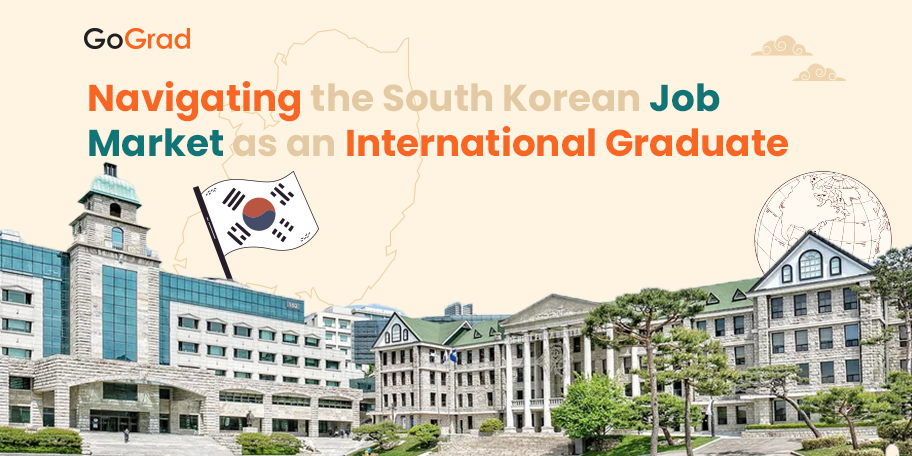South Korea has emerged as one of the leading countries in East Asia, not only for its high standard of education but also as a dynamic hub for job opportunities. International students who graduate from South Korean universities often find themselves in a unique position—armed with a world-class degree and the opportunity to gain a foothold in one of the region’s most vibrant economies. However, entering the job market in South Korea can be a complex process, especially for international graduates. Here’s a comprehensive guide to help you navigate the job market and maximize your chances of success.

1. Understanding the South Korean Job Market: Opportunities and Trends
South Korea’s economy is driven by industries such as technology, manufacturing, automotive, and entertainment. It’s home to major global players like Samsung, LG, Hyundai, and SK Group. The tech and engineering sectors, in particular, offer substantial opportunities for international graduates with the right qualifications and experience. However, sectors such as education, marketing, finance, and customer service are also growing, providing room for diverse career paths.
In recent years, there has been a noticeable shift toward hiring international talent, especially in fields that require high-level technical skills or foreign language expertise. Graduates with proficiency in English or Chinese, for instance, are highly sought after in roles related to international business, digital marketing, and translation services.
2. Language Proficiency: The Key to Success
While many multinational companies in South Korea operate in English, knowledge of the Korean language remains a significant advantage. TOPIK (Test of Proficiency in Korean) is a requirement for many jobs, especially for positions in local companies. While some international companies or roles in the tech sector may not require fluency, most employers will still look for at least a basic understanding of Korean to help integrate into the workplace and communicate with colleagues.
Additionally, language skills can be the deciding factor in securing roles outside of multinational companies, particularly in fields like marketing, education, or media. With South Korea’s emphasis on cultural integration, fluency in Korean can help you not only in your job search but also in creating a deeper connection to the local culture and business environment.
3. The Importance of Networking and Building Relationships
In South Korea, business relationships and personal connections can play a crucial role in job opportunities. The concept of “Inhwa”, which refers to harmonious relationships and group cohesion, is deeply embedded in South Korean work culture. While this can seem daunting at first for international graduates, understanding the value of networking and building relationships will give you a significant advantage.
One effective way to network is through job fairs, industry conferences, or internships, where you can meet potential employers and make connections. South Korea’s global recruitment events, often held at universities, offer excellent opportunities for international students to meet top employers and land jobs.
If you’re studying in South Korea, make sure to engage with alumni networks and student organizations, which often organize networking events. Many universities also offer career counseling services that include job listings, interview coaching, and resume workshops to help you make connections.
4. Applying for Jobs in South Korea: The Process
The job application process in South Korea is fairly straightforward, but it can be competitive, so it’s essential to be prepared. Here’s a step-by-step guide to applying for jobs:
-
Research Companies
Identify companies you’re interested in and check their official websites for job listings. Popular job portals like JobKorea and LinkedIn are also good platforms for finding open positions. Many companies also post job openings on their social media channels, so stay tuned to those.
-
Prepare Your Resume
Unlike Western-style resumes, South Korean employers often prefer a standardized CV format, which includes a passport photo and personal details such as your age and marital status. Make sure to highlight your qualifications, skills, and any experience you have in South Korea, as this can give you a distinct edge.
-
Tailor Your Cover Letter
Your cover letter should be specific to the role and demonstrate your knowledge of the company and your interest in working for them. Emphasize your unique value as an international graduate, showcasing how your diverse perspective can benefit the company.
-
Job Interviews
Interviews in South Korea often include behavioral and technical questions. Be prepared to explain how your background and skills align with the company’s goals. Demonstrate your commitment to the role and show that you understand the cultural nuances of working in South Korea.
-
Work Visa
Upon securing a job offer, you will need to apply for a work visa (commonly an E-7 Visa for professionals). This process typically requires you to submit documents such as your job offer letter, proof of qualifications, and an employment contract.
5. The Growing Gig Economy and Freelance Opportunities
For international graduates who may not want to commit to a full-time corporate job immediately, South Korea’s growing gig economy offers a range of flexible job opportunities. Freelancers are in demand, especially in the digital marketing, graphic design, web development, and content creation sectors.
Furthermore, many startups in Seoul are always on the lookout for talented individuals who can help them scale quickly. Freelancing gives international graduates the flexibility to work with multiple clients and gain diverse experience before committing to a long-term role.
6. Post-Study Work Visas and Pathways to Permanent Residency
One of the most attractive features of studying in South Korea is the post-study work visa options. After graduation, international students can apply for a D-10 Job Seeker Visa, which allows you to search for a job for up to six months. Once you find employment, you can switch to a work visa (usually the E-7 visa), which provides long-term work opportunities.
Additionally, South Korea offers relatively easy pathways to Permanent Residency (PR). With the new rules, it’s possible to apply for PR after three years of work, which is much faster compared to other countries in the region. Having a job in South Korea is an excellent way to build your career while laying the foundation for long-term residency.
7. South Korea’s Business Culture: What You Need to Know
Understanding South Korea’s business culture is key to success in the job market. The country is known for its confucian work ethics, emphasizing hierarchy, respect for authority, and teamwork. However, younger professionals are beginning to push for a more relaxed and flexible work environment, especially in tech startups.
As an international graduate, it’s important to strike a balance between showing respect for traditional values while demonstrating your innovation and adaptability. Employers value individuals who can think creatively while still respecting local customs and norms.
Navigating the South Korean job market can seem challenging at first, but with the right preparation and understanding of the cultural and professional landscape, you can open doors to amazing opportunities. Whether you’re entering the world of tech, marketing, education, or freelancing, South Korea offers a wealth of career paths for international graduates. By honing your skills, networking effectively, and embracing the local culture, you can build a fulfilling career in one of Asia’s most dynamic countries.
At GoGrad, we are committed to helping you succeed in your international education journey. From understanding the job market to exploring options for PR, we provide expert advice and support every step of the way. Ready to start your career in South Korea? Let’s make it happen together!

